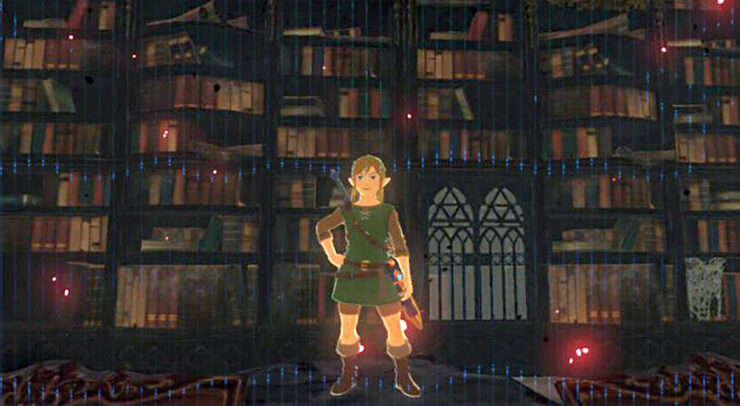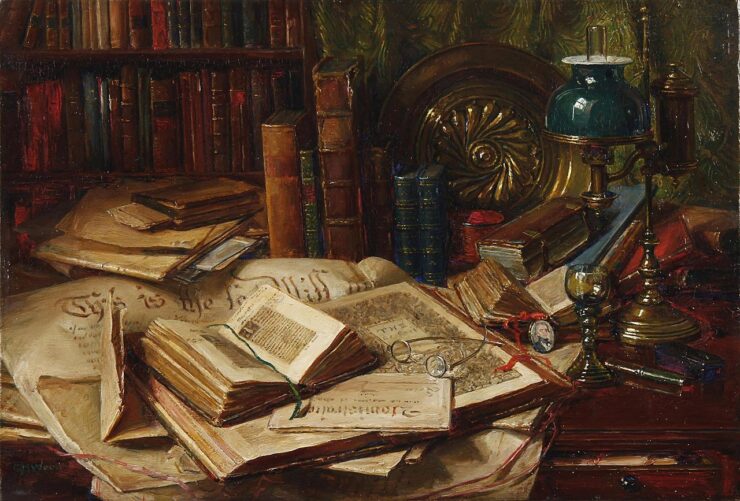Happy Zelda month to all who celebrate! At long last, we can return to Hyrule … and never come back. At least that’s how it feels: I’ve been playing The Legend of Zelda: Tears of the Kingdom in every available free moment and I am pretty sure I’ve barely scratched the surface of what this game has to offer (and demand from) its players. (Also, I’m really, really bad at building things in the game.)
But one cannot live on video games alone. At least, one shouldn’t. (Right?) One must have boundaries, or at least one must occasionally let one’s controllers recharge. One must stop staring at the screen and maybe, oh, pick up a book?
“One” is me, obviously. And maybe you, too. But what can a person read that’s anything like spending time in Hyrule?
Nothing. There is nothing that reads just like a Zelda game plays. I’m sorry! I don’t make the rules!
But we can find elements of Zelda in books—perhaps not the full alchemical magic of the games’ immersive, interactive world, but pieces of it, from the world itself to the kind of story it tells.
The World
It’s the obvious comparison, but if you play Zelda by running at length all over lush green fields, trying not to freeze to death on towering mountains, and almost fainting when you reach the heat of the desert, you’re basically a hobbit on a very long walk (giant feet notwithstanding). Hyrule has more drastic topography than Middle-earth, and is by necessity not quite as large (there’s no crossing the sea here—except in Wind Waker), but it is filled with fields and forests and mountains and hot southern lands and various species of dragons and other mystical creatures.
But in the same way that a young reader of The Lord of the Rings might picture other fantastic worlds as they do Middle-earth, a player of a Zelda game might begin to picture other magical worlds as Hyrule. In my head, Robin Hobb’s Six Duchies now look kind of like Hyrule. All that walking in Chuck Wendig’s Wanderers: Hyrule. The landscape in Destiny Soria’s Fire with Fire, complete with dragons: Hyrule. Station Eleven: absolutely in Hyrule, which could use more art in its frequently-post-catastrophe world.
I was going to say that despite all the road trips, American Gods is not Hyrule. But in the latest game, you can build cars. So that might change.
The Swordsman
Link is a beautiful cinnamon roll who can do no wrong, but is also prone—in my hands, at least—to do a lot of foolish crap. Like blow himself up or fall off cliffs or try to tackle enemies he has no idea how to defeat. But even when he’s in well over his head, he’s a delight, helpful to all, including that one guy who doesn’t know how to build signs. So he makes me think of perfect cinnamon roll Maia in The Goblin Emperor, of course. (Also the clothes that mean and do different things!)
But he also calls to mind Taran in Lloyd Alexander’s Chronicles of Prydain, who begins his journey as a child (as Link is, sometimes) and winds up a king (as Link probably won’t ever be, but there’s certainly something going on with the princess). Link and Taran have a lot to learn, and they wander a beautiful world full of evil and, occasionally, the undead (The Black Cauldron/various zombies and creepy underground things). If you dropped a few Koroks into Prydain, they wouldn’t be terribly out of place.
But Link largely travels alone, barring some non-human buddies who are along for the ride, like Navi (hey, listen!) or Midna. And in that sense he shares some qualities with the heroines of Garth Nix’s Old Kingdom (where there are also creepy undead things and magical items). Sabriel and Lirael spend a considerable amount of time alone but for the company of an animal friend who is not actually an animal at all (Mogget, the Disreputable Dog). The Old Kingdom, for that matter, also looks like Hyrule in my head now. Special magic powers? Family histories? Undead monsters? Enemies returning after long spans of time? Yes. And suddenly, I want an Old Kingdom game.
And, of course, Link might have a few parallels in my beloved Tess, of Rachel Hartman’s Tess of the Road, who also sets off alone, encounters unexpected creatures (including dragons), learns a lot, and then gets on a boat for the second part of her story, which is not entirely unlike what happens in various Zelda games leading up to and including Wind Waker.
The Princess
Oh, Zelda. When will Nintendo let us play your story? (And not just as your disembodied spirit, like in Spirit Tracks.) Over the years, Zelda has gone from a kidnapped princess to an important player in the affairs of Hyrule, a Sage, a wielder of magical abilities, and a time traveler (among other things). But her story is always in the background, which makes her hard to compare to books. But I think of Kristin Cashore’s Graceling Realm books, in which young Bitterblue is a rescued princess in the first book and the protagonist by the third. There is also a lot of saving the kingdom necessary in these books—sometimes from an evil king, sometimes from collective trauma.
And I think, a little, of Madeline Miller’s Circe, primarily in the sense that it takes a background character and brings her to the fore, complete with rich inner life and magical island. Like Circe, Zelda is ripe for a foregrounding, for a story in which she is the real protagonist.
The Mythology
This is where it gets truly impossible. Elements of the Zelda mythos change from game to game, from Ganon(dorf)’s origin (or a different villain, sometimes) to the spirits or goddesses or sages watching over Hyrule—though some villages and characters stay (mostly) the same. One time the moon was crashing! Sometimes there’s technology! Sometimes you’re in the sky and sometimes not! And I certainly can’t pretend to know every corner of the Zelda world; I only started playing (obsessively) with Ocarina of Time.
Also there is no accounting for the Wind Fish.
So this is where the lines get squiggly. You might see a comparison between the forces that fight over and protect Hyrule and the meddling (but captive) gods and goddesses of The Hundred Thousand Kingdoms (which also involves mysteries from the protagonist’s past, which frequently arise in Zelda). Meddling gods exist all over the place in fantasy, but the variety of ways in which they appear in Hyrule make it difficult to match things up with any sort of symmetry. There are new evil trees in Tears of the Kingdom, and there are any number of dense forests—so you might lean toward Mirkwood, or For the Wolf, or Uprooted (also featuring a dragon that isn’t a dragon), or Silver in the Wood. Wise creatures? Troubled royalty? Complex histories? Can I introduce you to The Empress of Salt and Fortune?
And what to compare to Koroks, or shrines, or Gorons, for that matter? (My brain just went “ROCKS FRIENDS” like Ludo in Labyrinth.) The sheer variety of stunning animals puts me in mind of The Forgotten Beasts of Eld, but that’s a very different kind of story. The depths in the new game recall The City of Ember, but again: a whole other kind of tale. (But really good caves.) Islands in the sky? Star Eater, but phew, that one comes with its own kind of darkness.
***
I’m willing to bet, though, that your own Zelda-like books might be wildly different from mine. As I thought about this—about what stories might reflect elements from these stories that are so easy to sink so deeply into—I realized something: The books I was coming up with are in many cases my favorites, the books I recommend all the time. The elements and themes and characters in them line up with the things I play for, in Zelda, because those things draw me in regardless of medium. Give me a brave princess and a do-gooder knight and a whole lot of interesting side characters and different cultures to explore and puzzles to solve or understand, and I’m in. Nature spirits? Gorgeous landscapes? Elements classic and fresh? It doesn’t get any better.
Now, to find my way to the desert.
Molly Templeton lives and writes in Oregon, and spends as much time as possible in the woods. Sometimes she talks about books on Twitter.














